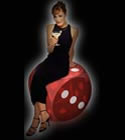16. What about raising before the flop to get more money in the pot ?
Ans : This is normally not the best strategy.
17. When would you generally go ahead and raise ?
Ans : When you hold a hand like A ![]() A
A ![]() 2
2 ![]() 3
3 ![]() .
.
18. What about position ?
Ans : It is very important, and you can play more reading hands in the late positions than in the early positions. However, you still shouldn’t play the medium-sized hands.
19. How does a lot of raising before the flop affect you ?
Ans : It adds marginally to your profits, but it adds tremendously to your fluctuations.
20. Does a lot of raising before the flop affect the number of hands that you should play ?
Ans : Not much. You still should play almost the same number of hands.
21. There is an exception. What is it ?
Ans : You should throw away the marginal hands that you sometimes can play in late position.
22. How do large pots affect your play on the flop ?
Ans : You are forced to play slightly looser. For example, you might go for a back-door low with an ace-deuce if you have something else, such as a back-door nut flush draw.
23. Given an example of a trap hand on the flop ?
Ans : The flop is 5 ![]() 6
6 ![]() 9
9 ![]() , and you have a trey-four with a jack-high flush draw. You should discard this hand if you are against several opponents.
, and you have a trey-four with a jack-high flush draw. You should discard this hand if you are against several opponents.
24. What if you are heads up ?
Ans : You might play this hand, unless you are against someone who won’t gamble.
25. In general, what kind of hands do you want to play ?
Ans : Those hands that can make the nuts.
26. What is a common exception ?
Ans : You are heads up and the hand has many different possibilities.
27. How do completed low hands affect the high hands ?
Ans : Completed low hands cause high hands to lose most of their value.
28. What does having back-door potential or a lot of outs do for you ?
Ans : Either may make your hand playable.
29. Give an example ?
Ans : You have A ![]() K
K ![]() K
K ![]() 3
3 ![]() , and the flop comes 10
, and the flop comes 10 ![]() 8
8 ![]() 4
4 ![]() . Even though you are drawing to only a deuce for the nut low, a king may win the whole pot for you, and another spade gives you the flush draw.
. Even though you are drawing to only a deuce for the nut low, a king may win the whole pot for you, and another spade gives you the flush draw.
30. What if you make an ace-trey low ?
Ans : You have to decide whether you should pay off a bet.
Introduction / General Concepts / More Specific Ideas / General Concepts / Position / Low Hands / High Hands / Your Starting Hand / Starting With Big Pairs / When You Are First In / How To Play Your Hand / Play on the Flop / When You Have the Best Hand / High Versus Low in Three-Handed Pots / Loose Games / Multiway Versus Short-handed Play / Scare Cards / Getting Counterfeited / Getting Quartered / Playing Against Steamers / Playing Against Tight, Solid Players / Your Playing Style / Reading Hands / Psychology / Afterthought


